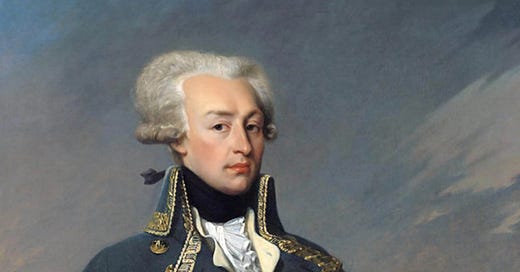People say history repeats itself. People also say history doesn’t repeat itself but it rhymes. I think both are true. In our culture of daily Twitter outrage and nonstop hot takes, wise people slow down and look at what happened other times humans found themselves in [current hot situation]. There’s lots to learn. Humans haven’t fundamentally changed since we first started writing things down. Today’s moment of looking back is by Valorie Clark from the history podcast Unruly Figures.
Grow slowly
Jeff
One.
Most Americans have heard of the famous French nobleman the Marquis de Lafayette, the hero of two revolutions. He’s known for delivering French aid to American rebels when they were losing hope in their fight against the English. After that, Lafayette led the moderate phase of the French Revolution, as well as inspired other democratic revolutions in Europe.
What’s less remembered is Lafayette’s earnest support for the abolition of slavery.
He genuinely believed in liberty for all, including enslaved Africans. However, even his closest friends, like George Washington, didn’t always agree. In fact, many bought into paternalistic notions that enslaved peoples, if set free, wouldn’t know what to do with themselves. They believed they were too dependent on their white enslavers to be able to responsibly take care of their own lives.
Lafayette didn’t agree with this notion and set out to disprove it. Probably while he was in North America in 1785, Lafayette bought land along the Oyapok River in the French colony of Cayenne, now called French Guiana. The plantation grew clove and cinnamon trees and came with around 70 enslaved Africans (Source). Lafayette changed things: He began paying them for their labor and forbade anyone from selling the slaves. He hoped that by paying people, keeping families together, providing better living conditions, and educating the children, the birth rate would rise and infant mortality would decrease, which could, at least, end the need for the slave trade. The larger goal was to prove that formerly enslaved people could take care of themselves, thereby disproving one of the excuses white people used to still hold slaves.
Unfortunately, Lafayette’s experiment was doomed by the chaos of the Reign of Terror. When he was arrested in 1792, his assets were seized, including the plantation in Guiana. The people were sold back into slavery, and we don’t know what became of them.
Two.
The Marquis de Lafayette as a Lieutenant General, by Joseph-Désiré Court.
Three.
The French National Anthem “Le Marseillaise” came back into popularity and was made the national anthem during Lafayette’s time leading the moderate phase of the French Revolution.








